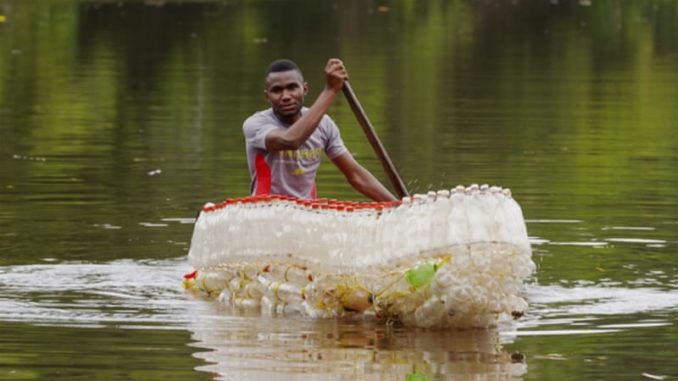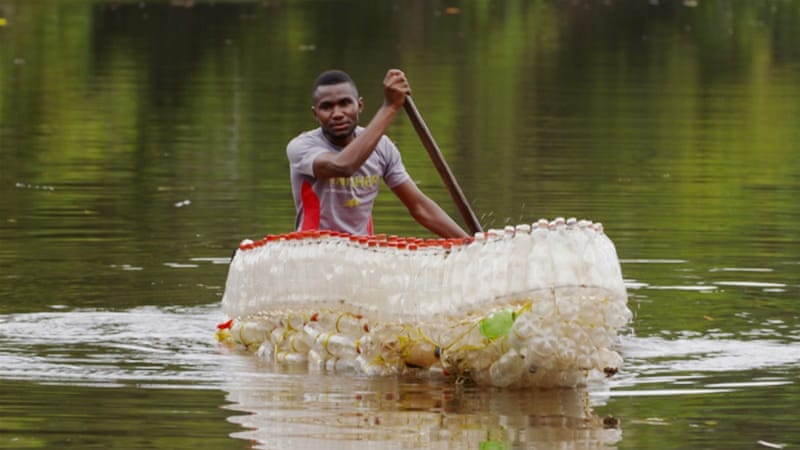

explosion of plastic waste across the globe is threatening the very survival of life on the planet.
Every year, up to 12 million metric tonnes of plastic enter our oceans, and plastic waste in the environment is set to triple in the next decade – poisoning marine life, littering landscapes and clogging waterways.
“The scale of the plastic problem is huge … If you look at our current economy it’s predominantly linear. We take a material out of the ground, we make something out of it and then the majority of that material gets thrown away,” says Dame Ellen MacArthur, the founder of Ellen MacArthur Foundation.
“We need to shift that economy to be one that uses materials rather than uses them up … To build a circular economy for plastic … we need to redesign the way we think about plastics, the way we design plastics, and the way we use plastics. So we need to eliminate the plastic that we don’t need. We need to innovate for different forms of plastic, which are 100 percent recyclable, and we need to look at how we circulate plastics – designing a system whereby that material is collected, has value and feeds back into the system … There is a massive opportunity to redesign our global economy.”
Awareness is on the rise and experts report that surveys reveal a sense of true determination throughout the world to solve the plastic issue.
earthrise went to Cameroon and the UK to look at solutions to ridding the world of our most pressing waste.
Cameroon’s Bottle Boats
‘It’s a legacy to take care of the environment, to take care of our planet, and to clean our cities,’ says businessman Ismael Essoume, who turns used plastic bottles into eco-boats
Ismael Essoume is a young businessman in Cameroon , who is cleaning up the country from plastic waste by picking up bottles that litter the natural environment and turning them into eco-boats.
He says it can help the environment as well as local fishermen.
“The pollution affected the river and now you cannot catch fish because the fishing area is full of plastic,” he says.
“So I thought to help not only clean the rivers but also to provide boats because it’s not easy in the villages for someone to buy a simple boat, so now we build cheaper eco-boats that could be useful.”
To date, he has built 37 boats which have removed over 24,000 bottles from Douala’s rivers.
Essoume has also created Cameroon’s first recycling scheme by establishing eco-bins – made from 255 bottles – where locals can discard their plastic bottles.
His initiative is not only raising awareness, it is changing the way Cameroonians approach waste.
“We want our city to be the example in Africa,” he says. “We aim to supply eco-bins in the areas of Douala, all the corners in front of all the shops, the supermarket, the school, so it will be easy to come and pick up the waste and recycle it. That is the vision.”
Designer Anna Bullus founded a company that makes coffee cups, shoes, keyrings and other products from recycled chewing gum.
In England , we look at one of the world’s stickiest problems – chewing gum.
The UK has a particularly bad problem with this plastic pollutant. But now a new invention could spell the end of the scourge.
Enviro-entrepreneur Anna Bullus has put in place a network of pink gum bins, which are themselves made of recycled gum.
As consumers discard their gum, the bins and their contents are sent off to be processed and recycled into a range of stylish products from shoes to coffee cups.
“All the solutions out there at the moment all address gum litter once it’s already been dropped. There is nothing out there that’s actually addressing it from the front end,” she says.
“So I saw a gap in the market for a product like this and also a way of tackling behavioural change when it comes to gum litter and giving people a positive way to dispose of their chewing gum.”
The invention is keeping streets gum free and paving the way for a new type of recycling.
Source: Al Jazeera
